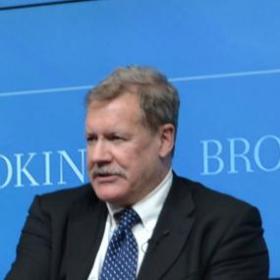
Banning Burqas: National Extremism and Europe’s Cities
Greg Austin wrote this piece for his column in New Europe.
It seems the lawmakers in Belgium are "fiddling while Rome burns." In April this year, 136 members of Belgium’s lower house voted to ban the burqa in public, while two abstained. No one voted against the measure. The move followed by one week the collapse of the country’s government over electoral boundaries based on language criteria, forcing the country to new elections.
With a national debt equal to 100 percent of GDP, this is an interesting set of priorities. Statistics on how many women in Belgium wear burqas are unavailable, but in nearby Denmark, the parliament there stopped its move toward a burqa ban when, according to Der Speigel, it found there were only a handful of women in the country who actually wore a burqa.
There is reason to beleive that the near-simultaneous actions of Belgian politicians to deepen their linguistic disputes while banning burqas are intimately connected. According to Belgian political scientist, Jean-Michel de Waele, commenting on the new elections in an interview for EurActiv, political parties in Belgium have been taken hostage by extremists.
What accounts for this cultural extremism in Belgium? It may actually have been aggravated simply by the "invasion" of the country by foreigners. Even though non-nationals in Belgium account for only 9 percent of the total population, among EU countries Belgium is near the top of the list for the percentage of its population represented by nationals of other countries.
In Belgium's case, according to Eurostat, the larger share of these foreigners are from other EU countries – most notably Italy (17 percent of the foreign population), France and the Netherlands (around 13 percent), and Spain (around 4 percent). Moroccans make up only 8 percent of the foreign population (or less than one percent of the total Belgian population).
This dominance of non-nationals in the Belgian population mix is not caused by its being host to the European Institutions. According to Eurostat, the European Union as a whole has a "relatively high net migration rate, which in 2008 was almost three times higher than the rate of natural population growth."
Europeans are on the move. EU internal migrants across national borders are increasing in percentage terms faster than immigrants into the EU from outside. Belgium's population is one of the most adept in Europe when it comes to foreign languages. What explains this contradiction between openness to the outside world evidenced by foreign language use and extremism centred on linguistic "purity"?
Look to the demography of the capital city. Over several decades, the Flemish-speaking population of the Belgian capital has been squeezed out or has chosen to move out, as the non-national population has grown dramatically. In London, there is a similar picture. Based on one analysis of the 2001 census, in large swathes of the north of the British city, the share of foreign-born population is higher than 34 percent. (This figure strangely includes children of immigrants.) Non-national population growth in Barcelona and Madrid has also been spectacular in recent years.
As Belgium this week contemplates its constitutional future and community-based divisions, it and the rest of Europe might ponder just how much the changing face of the capital city under pressure of internal EU migration was the cause of that. The other big factor is that local people are being squeezed out of the property market in their own capital cities by the property boom associated with this more lively market and more open investment regimes. There is a lesson in the demography of Brussels for the future of other EU capitals. All should note, however, that the immigrants who have changed the capital’s demographics and its politics most are not those very few women wearing burqas.

